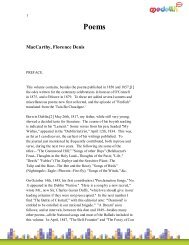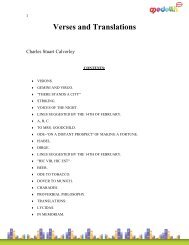Old Age and Death The Memoirs Of Jacques Casanova De Seingalt ...
Old Age and Death The Memoirs Of Jacques Casanova De Seingalt ...
Old Age and Death The Memoirs Of Jacques Casanova De Seingalt ...
Create successful ePaper yourself
Turn your PDF publications into a flip-book with our unique Google optimized e-Paper software.
34<br />
"<strong>The</strong>se verses had the desired effect. After a brief silence, <strong>Casanova</strong><br />
laughed <strong>and</strong> then said softly in my ear: '<strong>The</strong> rogue is right.' He went<br />
into the cafe <strong>and</strong> motioned to Costa to come out; they began to walk<br />
together calmly, as if nothing had happened, <strong>and</strong> they parted shaking<br />
h<strong>and</strong>s repeatedly <strong>and</strong> seemingly calm <strong>and</strong> friendly. <strong>Casanova</strong> returned to me<br />
with a cameo on his little finger, which by a strange coincidence,<br />
represented Mercury, the god-protector of thieves. This was his greatest<br />
valuable, <strong>and</strong> it was all that was left of the immense booty, but<br />
represented the character of the two restored friends, perfectly."<br />
Da Ponte precedes this account with a libellous narrative of <strong>Casanova</strong>'s<br />
relations with the Marquise d'Urfe, even stating that <strong>Casanova</strong> stole from<br />
her the jewels stolen in turn by Costa, but, as M. Maynial remarks, we<br />
may attribute this perverted account "solely to the rancour <strong>and</strong> antipathy<br />
of the narrator." It is more likely that <strong>Casanova</strong> frightened Costa almost<br />
out of his wits, was grimly amused at his misfortunes, <strong>and</strong> let him go,<br />
since there was no remedy to <strong>Casanova</strong>'s benefit, for his former<br />
rascality. <strong>Casanova</strong>'s own brief, anticipatory account is given in his<br />
<strong>Memoirs</strong>.<br />
In 1797, correcting <strong>and</strong> revising his <strong>Memoirs</strong>, <strong>Casanova</strong> wrote: "Twelve<br />
years ago, if it had not been for my guardian angel, I would have<br />
foolishly married, at Vienna, a young, thoughtless girl, with whom I had<br />
fallen in love." In which connection, his remark is interesting: "I have<br />
loved women even to madness, but I have always loved liberty better; <strong>and</strong><br />
whenever I have been in danger of losing it, fate has come to my rescue."<br />
While an identification of the "young, thoughtless girl" has been<br />
impossible, M. Rava believes her to be "C. M.," the subject of a poem<br />
found at Dux, written in duplicate, in Italian <strong>and</strong> French, <strong>and</strong> headed
















